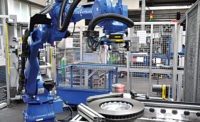On very hot days, a person who arrives at work after a long commute longs for the coolness and comfort of an air-conditioned office. To ensure this scenario, however, the air conditioning system must be reliable. Belimo USA helps manufacturers of these systems make them reliable.
Opened in 1987 in Danbury, CT, Belimo USA develops and produces actuators, valves and sensors that optimize the energy efficiency of HVAC systems. Assembly processes at the company’s 300,000-square-foot plant include fastening and pressing of parts.
Last year, as part of the plant’s lean manufacturing approach, managers focused on improving the efficiency of transporting metal parts to assembly workcells. The method at the time involved moving small wooden crates full of parts to each cell, having a worker unload the parts as needed and bringing them to a table or bin for easy access. Each crate contained up to 1,400 parts from supplier Wisconsin Metal Parts Inc. (WMP).
“The crates hold parts well, but they are easily damaged, heavy, expensive and difficult to move,” explains Mike Gallo, manufacturing engineer at Belimo. “We felt that using an existing reusable corrugated box was the best option. What was missing was a method to easily open, close and secure the boxes.”
Gallo did some online research and came across Box Latches made by Eco Latch Systems LLC in Pewaukee, WI. He immediately ordered hundreds of medium latches (totaling $500), before learning that they were already in use at the company’s Hinwil, Switzerland, plant to close corrugated boxes that move along conveyors and are vacuum lifted and placed on palettes.
Jim Wilson, CEO of Eco Latch, says the latches eliminate the need for tape to close a corrugated box and let manufacturers reuse the boxes and latches indefinitely. The latches slide easily onto the box flaps to keep them secure. Workers slide the latches off to open the boxes. Each latch is strong enough to keep a 40-pound box of nuts and bolts closed when turned upside down.
Made of durable recyclable plastic, the latch is applied to the box top or bottom without or with anchors. Boxes closed with the latch stack easily, and a label can be affixed on the latch. Large latches are available for use with one or two anchors. Wilson says a small latch is in the final stages of development that is half the weight of the large latches.
After testing the latches, Belimo USA was so impressed it decided to not buy a new set of wooden crates for $15,000. Instead, the company designed new compartment inserts that get placed in the boxes. (The inserts cost just $500.) Belimo also setup a closed-loop delivery system with WMP to repurpose these boxes. WMP places its parts in the boxes, stacks them on palettes and ships them to Belimo. Workers there transport the boxes to the assembly cells. As the boxes are emptied, they are stacked eight high and shrink-wrapped on palettes, and sent back to WMP to repeat the process.
According to Wilson, each palette that WMP ships to Belimo weighs 180 pounds, which is considerably less than the previous setup (500 pounds). Equally beneficial, the boxes on the palette contain twice as many parts as before.
To further improve sustainability and the transport and flow of parts in latch-closed boxes, Gallo’s team has replaced some plastic totes with custom-produced boxes. These boxes lack two minor flaps, making it easy for assemblers at their workcells to close them with latches or keep them open using plastic clips from Bee Packaging.
Belimo is also pursuing a box-repurposing arrangement with another downstream supplier of parts: Alton Manufacturing of Rochester, NY. For more information on latches that enable tape-free closing of cardboard boxes, call 920-541-3404 or visit https://boxlatch.com.





